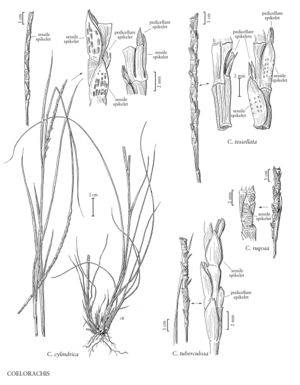Difference between revisions of "Coelorachis tessellata"
Common names: Pitted jointgrass
Synonyms: Manisuris tessellata unknown
Treatment appears in FNA Volume 25. Treatment on page 688.
FNA>Volume Importer |
FNA>Volume Importer |
||
| Line 20: | Line 20: | ||
-->{{Treatment/Body | -->{{Treatment/Body | ||
|distribution=Miss.;Fla.;Ala.;Ga.;La. | |distribution=Miss.;Fla.;Ala.;Ga.;La. | ||
| − | |discussion=<p>Coelorachis tessellata is endemic to the southern coastal plain of the United States, extending from Louisiana to northern Florida, although it is rare in Florida. It grows in bogs and moist pine woods, especially flatwoods.</p> | + | |discussion=<p><i>Coelorachis tessellata</i> is endemic to the southern coastal plain of the United States, extending from Louisiana to northern Florida, although it is rare in Florida. It grows in bogs and moist pine woods, especially flatwoods.</p> |
|tables= | |tables= | ||
|references= | |references= | ||
| Line 41: | Line 41: | ||
|publication year= | |publication year= | ||
|special status= | |special status= | ||
| − | |source xml=https://jpend@bitbucket.org/aafc-mbb/fna-data-curation.git/src/ | + | |source xml=https://jpend@bitbucket.org/aafc-mbb/fna-data-curation.git/src/8f726806613d60c220dc4493de13607dd3150896/coarse_grained_fna_xml/V25/V25_1644.xml |
|subfamily=Poaceae subfam. Panicoideae | |subfamily=Poaceae subfam. Panicoideae | ||
|tribe=Poaceae tribe Andropogoneae | |tribe=Poaceae tribe Andropogoneae | ||
Revision as of 16:32, 18 September 2019
Plants cespitose. Culms 80-120 cm, compressed4ceeled. Sheaths compressed-keeled; blades to 41 cm long, to 7.8 mm wide, folded to flat, scabrous above. Rames 4.5-7(12) cm. Sessile spikelets 3.9-6.2 mm long, 2.1-2.4 mm wide; lower glumes with rectangular pits, keels narrowly winged distally. Pedicellate spikelets 2.3-2.7 mm, reduced to scales. 2n = unknown.
Distribution
Miss., Fla., Ala., Ga., La.
Discussion
Coelorachis tessellata is endemic to the southern coastal plain of the United States, extending from Louisiana to northern Florida, although it is rare in Florida. It grows in bogs and moist pine woods, especially flatwoods.
Selected References
None.
Lower Taxa
None.
